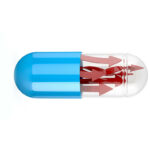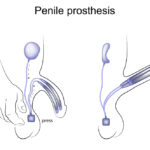Mediterranean Diet: Can It Improve Erections?
“You are what you eat” has been a popular phrase in English for decades. And it makes sense. Much of a person’s overall health is linked to their eating habits. A balanced, nutritious diet can lower risk for a variety of health conditions, like heart disease and diabetes. And a diet full of fast food and TV dinners could have the opposite effect.

Scientists have studied the way a man’s eating habits may affect his ability to get erections. Not surprisingly, men with healthier diets often fare better.
This notion applies to sexual health, too. For example, scientists have studied the way a man’s eating habits may affect his ability to get erections. Not surprisingly, men with healthier diets often fare better.
So what should men eat? While choosing healthy foods is wise, researchers have found that the Mediterranean diet could be an easy, effective path to better erections in the future.
For example, a 2020 JAMA Network Open study investigated the link between diet and erections in over 21,000 men aged 40 to 75 living in the United States. The researchers discovered that men who followed a Mediterranean or similar diet were less likely to have erectile dysfunction (ED) compared to those who didn’t.
And in 2021, researchers presented preliminary results on this topic at the European Society of Cardiology’s annual meeting. After reviewing data from 250 men with high blood pressure and ED, they reported that the Mediterranean diet could be linked to better erectile function.
What is a Mediterranean Diet?
A Mediterranean diet is widely eaten in countries around the Mediterranean Sea, such as Spain, Italy, and Greece.
A Mediterranean diet is widely eaten in countries around the Mediterranean Sea, such as Spain, Italy, and Greece. Because it encompasses a variety of cultures, there’s no one “official” Mediterranean diet. But diets in this geographic area have some similarities:
- More plant-based foods. Fruits, vegetables, whole grains, nuts, and legumes (like beans and chickpeas) are staples of a Mediterranean diet.
- Limited red meat, eggs, and dairy. Red meat is seldom eaten on a Mediterranean diet. Eggs and butter are used sparingly.
- Moderate amounts of lean meats. Mediterranean diet followers eat poultry, like chicken and turkey, every once in a while.
- More seafood. Fish and shellfish—such as salmon, tuna, and clams—might be eaten several times a week.
- Healthy fats. Monounsaturated fats, like olive oil and avocados, are favored over saturated fats and trans fats, which are found in items like red meat, cakes, cookies, and processed foods.
- Fewer desserts. Sweets and traditional desserts are eaten in moderation. Fruit is a frequent dessert substitute.
- Alcohol. Alcoholic beverages, such as red wine, are included in a Mediterranean diet, but only if safe to do so. People should avoid alcohol if they are pregnant, tend to misuse alcohol, or have a health condition that worsens with alcohol use.
- Fewer processed foods. Following a Mediterranean diet often means preparing meals from fresh, basic ingredients rather than relying on processed foods.
Mediterranean Diet and ED: What’s The Connection?
How might a Mediterranean diet help with a man’s erections?
It’s good for the cardiovascular system
This system includes the heart and the roughly 60,000 miles of blood vessels throughout the body. Some of these blood vessels are in the penis. Because a firm erection depends on blood flow, these blood vessels need to be clear.
Research suggests that the Mediterranean diet keeps the lining of blood vessels healthy and reduces the risk of atherosclerosis (hardening of the arteries), which can interfere with blood flow. With the path open, blood can flow to the penis—and form an erection—more easily.
It helps with the production of nitric oxide
This chemical plays an important role in erections. Before blood can flow into the penis for an erection, the arteries need to relax and dilate. Nitric oxide is essential for this process.
It lowers a man’s risk for diabetes
Men with diabetes are at higher risk for ED than men without diabetes. They also tend to get ED several years earlier.
High blood sugar can damage blood vessels and nerves. As noted above, blood vessel damage can limit blood flow into the penis. And nerve damage can interfere with signals from the brain that “tell” the penis to start an erection when a man is sexually aroused.
It helps with weight management
The heavier a man is, the higher his risk for ED. A healthy diet, combined with physical activity, can be a good way to manage weight. That said, people still need watch their calories, even with a Mediterranean diet.
Putting it All Together
So can eating a Mediterranean diet prevent ED altogether? Could it cure ED?
Scientists aren’t sure yet, but they’re interested in finding out. For now, research suggests that men who follow a healthier diet could be less likely to develop ED later. But researchers don’t know yet whether diet can prevent ED altogether or whether changing dietary habits can improve ED in men who already have trouble with erections.
The good news, however, is that a healthy diet benefits the body from head to toe. And many people find that taking care of the whole body improves their sexual health as well as their overall wellbeing.
Resources
Central European Journal of Urology
Di Francesco, Simona and Raffaele Lanfranco Tenaglia
“Mediterranean diet and erectile dysfunction: a current perspective”
(Published: June 11, 2017)
http://cejuonline.eu/journal/2017/mediterranean-diet-sexual-function-erectile-dysfunction-nitric-oxide-1356.php
Cleveland Clinic
“Blood Vessels”
https://my.clevelandclinic.org/health/body/21640-blood-vessels
(Last reviewed: July 9, 2021)
European Society for Cardiology
“Mediterranean diet shows promise in men with erectile dysfunction”
(Press release. August 25, 2021)
https://www.escardio.org/The-ESC/Press-Office/Press-releases/mediterranean-diet-shows-promise-in-men-with-erectile-dysfunction
EverydayHealth.com
Salomon, Sheryl Huggins
“8 Scientific Health Benefits of the Mediterranean Diet”
(March 19, 2019)
https://www.everydayhealth.com/mediterranean-diet/scientific-health-benefits-mediterranean-diet/
HealthDay.com
Thompson, Dennis
“Change in the Kitchen Could Help Men in the Bedroom”
(August 30, 2021)
https://consumer.healthday.com/8-26-one-change-in-the-kitchen-could-help-men-in-the-bedroom-2654761030.html
JAMA Network Open
Bauer, Scott R., MD, ScM, et al.
“Association of Diet With Erectile Dysfunction Among Men in the Health Professionals Follow-up Study”(Published: November 13, 2020)
https://jamanetwork.com/journals/jamanetworkopen/fullarticle/2772916
MedlinePlus.gov
“Mediterranean diet”
(Review date: July 13, 2020)
https://medlineplus.gov/ency/patientinstructions/000110.htm
Stroke
Jimenez-Torres, Jose, et al.
“Mediterranean Diet Reduces Atherosclerosis Progression in Coronary Heart Disease: An Analysis of the CORDIOPREV Randomized Controlled Trial”
(Originally published: August 10, 2021)
https://www.ahajournals.org/doi/full/10.1161/STROKEAHA.120.033214






